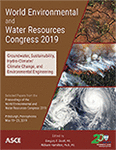World Environmental and Water Resources Congress 2019
Analysis of Climate Change Impacts on Rainfall Trends in the Orsang River Basin, India
Publication: World Environmental and Water Resources Congress 2019: Groundwater, Sustainability, Hydro-Climate/Climate Change, and Environmental Engineering
ABSTRACT
In a country India, in the most of the regions, almost 80% of the annual precipitation is concentrated during monsoon months. As a result, the inflows in the river and inflows available for the water resources projects are also concentrated in the monsoon season (i.e. June to October). In view of the changing climate, analysis of changing rainfall pattern bears importance for the safe operation of the hydraulic structures and also, for water and food security. In this study, monthly time period of the monsoon season and annual rainfall trends have been studied to assess the impact of climate change in the region. The monthly rainfall data series from 1970 to 2016 (47 years) have been made available for the raingauge sites in the Unch watershed of Orsang River. The Orsang River is a tributary of the Narmada River in the Gujarat State of India. The monthly and annual rainfall data series trend analysis has been carried out for these raingauges installed in a Orsang River basin. Four raingauge stations namely, Kalarani, Sanjuli, Vora, and Dhandhoda are installed in the Unch watershed of the Orsang River basin. Sanjuli and Dhandhoda are located in the Chhota Udepur Tehsil of Vadodara District, while Kalarani and Vora are located in a Sankheda and Tilakwada Tehsil of the Vadodara District respectively. It is summarized that the climate change impacts on the small-regional scale study area confirms the increase in the annual rainfall magnitude, decreasing June month rainfall, increasing July month rainfall, decreasing in the August month rainfall magnitude, decreasing in the intense rainfall in the month of August, and shifting of the monsoon season to start and finish late.
Get full access to this article
View all available purchase options and get full access to this chapter.
ACKNOWLEDGMENT
The authors are thankful to the Higher Education Department and Climate Change Department of Government of Gujarat of India for funding the climate change project, under which this study has been carried out. Also, the authors are thankful to the State Water Data Centre (SWDC), Gandhinagarfor providing the necessary data.
REFERENCES
Mamuye, M. (2018). "Review on Impacts of Climate Change on Watershed Hydrology." Journal of Environment and Earth Science, 8(1), 91-99.
Arora, V. K., and Boer, G. J. (2001).“Effects of simulated climate change on the hydrology of major river basins,” J. Geophys. Res. Atmos., 106(D4), 3335–3348.
Bhatt, D. and Mall, R. K. (2015). “Surface Water Resources, Climate Change and Simulation Modeling,” Aquatic Procedia, 4, 730–738.
Jain, S. K., and V. Kumar. (2012). “Trend Analysis of Rainfall and Temperature Indices of North-East India Region.” Current Science, 102 (1), 37-49.
Jha, M. K. et al. (2004). “Climate Change Sensitivity Assessment on Upper Mississippi River Basin Streamflows Using SWAT.” Journal of The American Water Resources Association, 42 (4), 997–1015.
Kendall, M.G. (1975). “Rank Correlation Methods.” 4th Edition, Charles Griffin, London, UK.
Kumar, V., Jain, S. K. and Singh, Y. (2010). "Analysis of long-term rainfall trends in India." Hydrological Sciences Journal, 55(4), 484–496.
Mann, H.B., 1945. “Nonparametric tests against trend.” Econometrica, 13, 245–259.
Marshall, E., and Randhir, T. (2008). “Effect of climate change on watershed system: A regional analysis.” Climate Change, 89(3-4), 263–280.
Mondal, A., Kundu, S. and Mukhopadhyay, A. (2012). "Rainfall Trend Analysis By Mann-Kendall Test: a Case Study of North-Eastern Part of Cuttack District, Orissa." International Journal of Geology, Earth and Environmental Sciences, 2(1), 2277–208170.
Pal, I. and Al-Tabbaa, A. (2009). “Trends in seasonal precipitation extremes – an indicator of climate change in Kerala, India.” Journal of Hydrology, 367, 62-69.
IPCC-Intergovernmental Panel on Climate Change (2007). “The Physical Science Basis. Contribution of Working Group I to the Fourth Assessment Report of the Intergovernmental Panel on Climate Change.” Cambridge University Press, Cambridge, UK.
Gosain, A. K., S. Rao, and A. Arora. (2001). “Climate change impact assessment of water resources of India.” Current Science, 101 (3), 356-361.
Information & Authors
Information
Published In
World Environmental and Water Resources Congress 2019: Groundwater, Sustainability, Hydro-Climate/Climate Change, and Environmental Engineering
Pages: 325 - 335
Editors: Gregory F. Scott and William Hamilton, Ph.D.
ISBN (Online): 978-0-7844-8234-6
Copyright
© 2019 American Society of Civil Engineers.
History
Published online: May 16, 2019
Authors
Metrics & Citations
Metrics
Citations
Download citation
If you have the appropriate software installed, you can download article citation data to the citation manager of your choice. Simply select your manager software from the list below and click Download.
